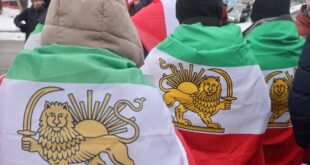 TEHRAN (Fars News Agency)- Iranian Foreign Ministry Spokesman Seyed Mohammad Ali Hoseini said Tehran would study any official request for attending negotiations with the United States on the Iraqi issue.
TEHRAN (Fars News Agency)- Iranian Foreign Ministry Spokesman Seyed Mohammad Ali Hoseini said Tehran would study any official request for attending negotiations with the United States on the Iraqi issue.
Speaking to reporters in his fourth weekly press briefing here on Sunday, Hoseini pointed to previous requests by the Iraqi officials for the arrangement of direct talks between Iran and the US, and reminded, “The Iraqi officials then stressed that arrangement of direct talks between Iran and the US over the issue of their country was necessary. Consequently, Iran stated its transparent stance on the issue and studied the demand of the Iraqi officials.”
He said that a similar request has lately been raised by some Iraqi and US officials, adding that Iran would study the case once it is officially in receipt of such a request.
Yet, the diplomat declined to comment on Iran’s likely reply to such a request.
Elsewhere, he pointed to Iran’s nuclear issue, and said, “At present the group 5+1 is working on the UN Security Council option, but they must beware of the consequences of such a choice as it will certainly complicate the case more and will bring a delay to the attainment of a mutual understanding.”
Hoseini reminded that Iran has stressed the need for the resumption of talks and exclusion of the case from the UNSC working agenda.
He also warned that his country would reciprocate any UNSC resolution against Iran, saying that the type and intensity of the said reaction by the Islamic Republic will depend on the content and nature of the likely sanctions.
Hoseini viewed Russians’ stance on the draft of UN resolution as more pragmatic, and said that Moscow’s more moderate views about the sanction issue is a result of its continued exchange of views and discussions with Iran.
He also pointed to Iran-Russia relations as a major factor paving the grounds for a more transparent discussion of affairs and issues under a more cordial atmosphere.
Meantime, he stressed that Tehran believes suspension of nuclear enrichment activities would be a completely irrational move.
“We do not perceive any rationale for suspending our uranium enrichment activities,” Hoseini reiterated.
Asked to comment on the main impediment in the way of the arrangement of Iran-West nuclear talks, he said Iran has always called for unconditional negotiations with the other party, “and we have always informed 5+1 member states that negotiation is the best choice and solution to the problem as it can produce positive results favorable to both sides.”
The diplomat further pointed to West’s demanded prerequisites for the resumption of talks, and stressed, “Although both parties are demanding the resumption of talks, the kind of negotiation either side is considering is different, as we believe in prerequisite-free talks but they are demanding pre-conditioned negotiations.”
Also asked if the recent decrease in the activities of the Supreme National Security Council (SNSC) -headed by Ali Larijani- means increased responsibility and authority for the Foreign Ministry concerning the country’s nuclear case, the spokesman underlined that dealing with the nuclear issue is merely a responsibility of the SNSC, and said that his ministry is just contributing its part to the nuclear issue and that the SNSC is the decision-making center regarding the nuclear case.
In another part, he pointed to a meeting between members of the anti-Iranian terrorist group Mojahedin-e Khalq Organization (MKO) and Norwegian parliament members, and underlined that the meeting is a further proof substantiating the West’s double standards in view of terrorism.
Reminding that Norway’s ambassador to Tehran has been summoned to the Foreign Ministry to be briefed about Iran’s stance towards such a measure taken by the Norwegian parliament, Hoseini said that talks are still going on in this ground.
Asked if the maneuvers staged by Iran and the US should be considered as a cold war between Tehran and Washington, Hoseini quoted a recent statement released by the Islamic Revolutionary Guards Corps (IRGC) describing the war games as a preplanned program in the IRGC calendar.
“Our maneuvers are not meant to pose a threat to any country. They are, rather, aimed at reinvigorating Iran’s power of deterrence,” he continued.
And as to why Iran’s lawsuit has not yet been raised during the trial of the former Iraqi dictator Saddam Hussein, the Foreign Ministry Spokesman said that the Islamic Republic has already lodged its complaint in this regard, and that the Iraqi officials have promised to consider the lawsuit, “but not in the present court”.
“They have announced that the present court is not qualified to judge on the case and that the issue must be verified at a separate court,” he added.
The Foreign Ministry spokesman also said that the Belarusian President Aleksandr Lukashenko is scheduled to arrive in Tehran tonight, adding that during his two-day stay, he is scheduled to meet with various Iranian officials, including President Ahmadinejad, to discuss bilateral ties and other issues of mutual interest.
He also informed of an upcoming visit to Tehran by the Iraqi President Jalal Talibani, but declined to mention the exact date of the trip.
 Eurasia Press & News
Eurasia Press & News



